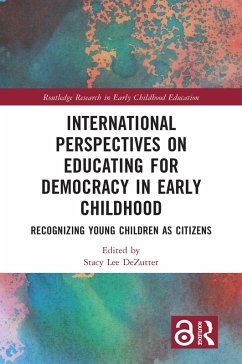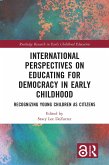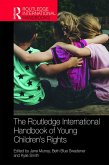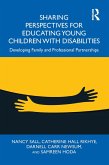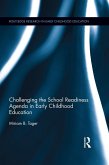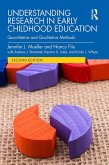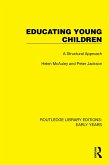International Perspectives on Educating for Democracy in Early Childhood (eBook, ePUB)
Recognizing Young Children as Citizens
Redaktion: Dezutter, Stacy Lee
40,95 €
40,95 €
inkl. MwSt.
Sofort per Download lieferbar

20 °P sammeln
40,95 €
Als Download kaufen

40,95 €
inkl. MwSt.
Sofort per Download lieferbar

20 °P sammeln
Jetzt verschenken
Alle Infos zum eBook verschenken
40,95 €
inkl. MwSt.
Sofort per Download lieferbar
Alle Infos zum eBook verschenken

20 °P sammeln
International Perspectives on Educating for Democracy in Early Childhood (eBook, ePUB)
Recognizing Young Children as Citizens
Redaktion: Dezutter, Stacy Lee
- Format: ePub
- Merkliste
- Auf die Merkliste
- Bewerten Bewerten
- Teilen
- Produkt teilen
- Produkterinnerung
- Produkterinnerung

Bitte loggen Sie sich zunächst in Ihr Kundenkonto ein oder registrieren Sie sich bei
bücher.de, um das eBook-Abo tolino select nutzen zu können.
Hier können Sie sich einloggen
Hier können Sie sich einloggen
Sie sind bereits eingeloggt. Klicken Sie auf 2. tolino select Abo, um fortzufahren.

Bitte loggen Sie sich zunächst in Ihr Kundenkonto ein oder registrieren Sie sich bei bücher.de, um das eBook-Abo tolino select nutzen zu können.
This book brings together established and emerging scholars from around the globe to highlight new directions for research on young children as active, engaged citizens of classrooms. Chapters discuss the child-as-citizen in relation to issues including gender, class, race, tribal status, and linguistic diversity.
- Geräte: eReader
- ohne Kopierschutz
- eBook Hilfe
Andere Kunden interessierten sich auch für
![International Perspectives on Educating for Democracy in Early Childhood (eBook, PDF) International Perspectives on Educating for Democracy in Early Childhood (eBook, PDF)]() International Perspectives on Educating for Democracy in Early Childhood (eBook, PDF)40,95 €
International Perspectives on Educating for Democracy in Early Childhood (eBook, PDF)40,95 €![The Routledge International Handbook of Young Children's Rights (eBook, ePUB) The Routledge International Handbook of Young Children's Rights (eBook, ePUB)]() The Routledge International Handbook of Young Children's Rights (eBook, ePUB)44,95 €
The Routledge International Handbook of Young Children's Rights (eBook, ePUB)44,95 €![Sharing Perspectives for Educating Young Children with Disabilities (eBook, ePUB) Sharing Perspectives for Educating Young Children with Disabilities (eBook, ePUB)]() Nancy SallSharing Perspectives for Educating Young Children with Disabilities (eBook, ePUB)43,95 €
Nancy SallSharing Perspectives for Educating Young Children with Disabilities (eBook, ePUB)43,95 €![Challenging the School Readiness Agenda in Early Childhood Education (eBook, ePUB) Challenging the School Readiness Agenda in Early Childhood Education (eBook, ePUB)]() Miriam B. TagerChallenging the School Readiness Agenda in Early Childhood Education (eBook, ePUB)29,95 €
Miriam B. TagerChallenging the School Readiness Agenda in Early Childhood Education (eBook, ePUB)29,95 €![Understanding Research in Early Childhood Education (eBook, ePUB) Understanding Research in Early Childhood Education (eBook, ePUB)]() Jennifer J. MuellerUnderstanding Research in Early Childhood Education (eBook, ePUB)40,95 €
Jennifer J. MuellerUnderstanding Research in Early Childhood Education (eBook, ePUB)40,95 €![Educating Young Children (eBook, ePUB) Educating Young Children (eBook, ePUB)]() Helen McAuleyEducating Young Children (eBook, ePUB)29,95 €
Helen McAuleyEducating Young Children (eBook, ePUB)29,95 €![The Routledge Handbook of Digital Literacies in Early Childhood (eBook, ePUB) The Routledge Handbook of Digital Literacies in Early Childhood (eBook, ePUB)]() The Routledge Handbook of Digital Literacies in Early Childhood (eBook, ePUB)44,95 €
The Routledge Handbook of Digital Literacies in Early Childhood (eBook, ePUB)44,95 €-
-
-
This book brings together established and emerging scholars from around the globe to highlight new directions for research on young children as active, engaged citizens of classrooms. Chapters discuss the child-as-citizen in relation to issues including gender, class, race, tribal status, and linguistic diversity.
Dieser Download kann aus rechtlichen Gründen nur mit Rechnungsadresse in A, B, BG, CY, CZ, D, DK, EW, E, FIN, F, GR, HR, H, IRL, I, LT, L, LR, M, NL, PL, P, R, S, SLO, SK ausgeliefert werden.
Produktdetails
- Produktdetails
- Verlag: Taylor & Francis
- Seitenzahl: 360
- Erscheinungstermin: 8. Mai 2023
- Englisch
- ISBN-13: 9781000865837
- Artikelnr.: 67589006
- Verlag: Taylor & Francis
- Seitenzahl: 360
- Erscheinungstermin: 8. Mai 2023
- Englisch
- ISBN-13: 9781000865837
- Artikelnr.: 67589006
- Herstellerkennzeichnung Die Herstellerinformationen sind derzeit nicht verfügbar.
Stacy Lee DeZutter is an Associate Professor of Education and Psychology and the Chair of the Education Department at Millsaps College in Jackson, Mississippi, USA.
1. Introduction: Recognizing Young Children as Citizens in Classrooms
Section 1: How should citizenship education be conceptualized? 2. Young
Children as Democratic Participants: Ethical Consideration for Research and
Practice 3. Challenges for Policy and Practice for Young Children's
Community Building Identified in a Study of Young Children's Civic Action
4. Gender, Sexual Identities and Citizenship Education: A Critical
Discourse Analysis of Canadian Kindergarten Curricula 5. Teaching
Demokrasia and Uraia in Tanzanian Pre-Primary Education Programs Teaching
Demokrasia and Uraia in Tanzanian Pre-Primary Education Programs 6.
Realistic Utopias of the Commons in Education 7. Collaborative Commentary:
How Should Citizenship Education Be Conceptualized? 8. Active Citizenship
Education with Young Children: Key Themes, Possibilities and Future
Research Directions Section 2: How Do Young Children Think About and Enact
Citizenship? 9. Citizen Children Raising Their Voices and Striving to Save
the Planet ... and Themselves 10. Investigating the Implicit: An
Exploration of Elementary Students' Conceptions of Gender 11. Using
Multimodal Assessment to Empower Children as Citizens After a Disaster
Event 12. "I Don't Want You to Say No, I Want You to Say Yes": One
Two-Year-Old's Transformative Dissent 13. Collaborative Commentary: How Do
Children Think About and Enact Citizenship? 14. Broadening the Scope of
Civic Education - Critical Contributions Section 3: How Do Teachers Support
Young Children as Citizens? 15. Children Are Citizens: Encouraging Civic
Agency in Our Youngest Learners 16. Teaching Children the Power of Their
Voice in a Preschool Classroom 17. Teaching the Black Lives Matter at
School: 13-Guiding Principles as Cultural Citizenship Education for Young
Children 18. Children's Empowered Inclusion in Early Childhood Education
for Sustainability 19. Comparing the Pacific and the Rural Northeast?
Meta-ethnographic Investigations of Citizenship(s) in Progressive ECE
Programs 20. Children as Citizens of a Global Society: Learning Together in
Culturally and Linguistically Diverse Classrooms 21. Collaborative
Commentary: How Do Teachers Support Children as Citizens 22. Love, Empathy,
and Global Citizenship Education 23. Children's Classroom Citizenship
Enactment: Challenges and Opportunities
Section 1: How should citizenship education be conceptualized? 2. Young
Children as Democratic Participants: Ethical Consideration for Research and
Practice 3. Challenges for Policy and Practice for Young Children's
Community Building Identified in a Study of Young Children's Civic Action
4. Gender, Sexual Identities and Citizenship Education: A Critical
Discourse Analysis of Canadian Kindergarten Curricula 5. Teaching
Demokrasia and Uraia in Tanzanian Pre-Primary Education Programs Teaching
Demokrasia and Uraia in Tanzanian Pre-Primary Education Programs 6.
Realistic Utopias of the Commons in Education 7. Collaborative Commentary:
How Should Citizenship Education Be Conceptualized? 8. Active Citizenship
Education with Young Children: Key Themes, Possibilities and Future
Research Directions Section 2: How Do Young Children Think About and Enact
Citizenship? 9. Citizen Children Raising Their Voices and Striving to Save
the Planet ... and Themselves 10. Investigating the Implicit: An
Exploration of Elementary Students' Conceptions of Gender 11. Using
Multimodal Assessment to Empower Children as Citizens After a Disaster
Event 12. "I Don't Want You to Say No, I Want You to Say Yes": One
Two-Year-Old's Transformative Dissent 13. Collaborative Commentary: How Do
Children Think About and Enact Citizenship? 14. Broadening the Scope of
Civic Education - Critical Contributions Section 3: How Do Teachers Support
Young Children as Citizens? 15. Children Are Citizens: Encouraging Civic
Agency in Our Youngest Learners 16. Teaching Children the Power of Their
Voice in a Preschool Classroom 17. Teaching the Black Lives Matter at
School: 13-Guiding Principles as Cultural Citizenship Education for Young
Children 18. Children's Empowered Inclusion in Early Childhood Education
for Sustainability 19. Comparing the Pacific and the Rural Northeast?
Meta-ethnographic Investigations of Citizenship(s) in Progressive ECE
Programs 20. Children as Citizens of a Global Society: Learning Together in
Culturally and Linguistically Diverse Classrooms 21. Collaborative
Commentary: How Do Teachers Support Children as Citizens 22. Love, Empathy,
and Global Citizenship Education 23. Children's Classroom Citizenship
Enactment: Challenges and Opportunities
1. Introduction: Recognizing Young Children as Citizens in Classrooms
Section 1: How should citizenship education be conceptualized? 2. Young
Children as Democratic Participants: Ethical Consideration for Research and
Practice 3. Challenges for Policy and Practice for Young Children's
Community Building Identified in a Study of Young Children's Civic Action
4. Gender, Sexual Identities and Citizenship Education: A Critical
Discourse Analysis of Canadian Kindergarten Curricula 5. Teaching
Demokrasia and Uraia in Tanzanian Pre-Primary Education Programs Teaching
Demokrasia and Uraia in Tanzanian Pre-Primary Education Programs 6.
Realistic Utopias of the Commons in Education 7. Collaborative Commentary:
How Should Citizenship Education Be Conceptualized? 8. Active Citizenship
Education with Young Children: Key Themes, Possibilities and Future
Research Directions Section 2: How Do Young Children Think About and Enact
Citizenship? 9. Citizen Children Raising Their Voices and Striving to Save
the Planet ... and Themselves 10. Investigating the Implicit: An
Exploration of Elementary Students' Conceptions of Gender 11. Using
Multimodal Assessment to Empower Children as Citizens After a Disaster
Event 12. "I Don't Want You to Say No, I Want You to Say Yes": One
Two-Year-Old's Transformative Dissent 13. Collaborative Commentary: How Do
Children Think About and Enact Citizenship? 14. Broadening the Scope of
Civic Education - Critical Contributions Section 3: How Do Teachers Support
Young Children as Citizens? 15. Children Are Citizens: Encouraging Civic
Agency in Our Youngest Learners 16. Teaching Children the Power of Their
Voice in a Preschool Classroom 17. Teaching the Black Lives Matter at
School: 13-Guiding Principles as Cultural Citizenship Education for Young
Children 18. Children's Empowered Inclusion in Early Childhood Education
for Sustainability 19. Comparing the Pacific and the Rural Northeast?
Meta-ethnographic Investigations of Citizenship(s) in Progressive ECE
Programs 20. Children as Citizens of a Global Society: Learning Together in
Culturally and Linguistically Diverse Classrooms 21. Collaborative
Commentary: How Do Teachers Support Children as Citizens 22. Love, Empathy,
and Global Citizenship Education 23. Children's Classroom Citizenship
Enactment: Challenges and Opportunities
Section 1: How should citizenship education be conceptualized? 2. Young
Children as Democratic Participants: Ethical Consideration for Research and
Practice 3. Challenges for Policy and Practice for Young Children's
Community Building Identified in a Study of Young Children's Civic Action
4. Gender, Sexual Identities and Citizenship Education: A Critical
Discourse Analysis of Canadian Kindergarten Curricula 5. Teaching
Demokrasia and Uraia in Tanzanian Pre-Primary Education Programs Teaching
Demokrasia and Uraia in Tanzanian Pre-Primary Education Programs 6.
Realistic Utopias of the Commons in Education 7. Collaborative Commentary:
How Should Citizenship Education Be Conceptualized? 8. Active Citizenship
Education with Young Children: Key Themes, Possibilities and Future
Research Directions Section 2: How Do Young Children Think About and Enact
Citizenship? 9. Citizen Children Raising Their Voices and Striving to Save
the Planet ... and Themselves 10. Investigating the Implicit: An
Exploration of Elementary Students' Conceptions of Gender 11. Using
Multimodal Assessment to Empower Children as Citizens After a Disaster
Event 12. "I Don't Want You to Say No, I Want You to Say Yes": One
Two-Year-Old's Transformative Dissent 13. Collaborative Commentary: How Do
Children Think About and Enact Citizenship? 14. Broadening the Scope of
Civic Education - Critical Contributions Section 3: How Do Teachers Support
Young Children as Citizens? 15. Children Are Citizens: Encouraging Civic
Agency in Our Youngest Learners 16. Teaching Children the Power of Their
Voice in a Preschool Classroom 17. Teaching the Black Lives Matter at
School: 13-Guiding Principles as Cultural Citizenship Education for Young
Children 18. Children's Empowered Inclusion in Early Childhood Education
for Sustainability 19. Comparing the Pacific and the Rural Northeast?
Meta-ethnographic Investigations of Citizenship(s) in Progressive ECE
Programs 20. Children as Citizens of a Global Society: Learning Together in
Culturally and Linguistically Diverse Classrooms 21. Collaborative
Commentary: How Do Teachers Support Children as Citizens 22. Love, Empathy,
and Global Citizenship Education 23. Children's Classroom Citizenship
Enactment: Challenges and Opportunities
